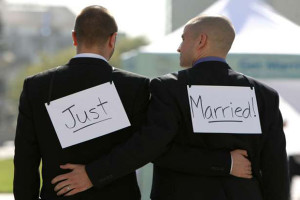It still remains that most states in the U.S ban gay marriage. There are only 12 states that allow same-sex marriage: Connecticut, Delaware, District of Columbia, Iowa, Maine, Maryland, Massachusetts, New Hampshire, New York, Rhode Island, Vermont, and Washington.
By Blaise Scemama
After a fierce debate and much opposition, gay marriage has become fully legalized in France, making it the 14th country to legalize same-sex marriage and to extend adoption rights to same-sex couples. It seems that recently the idea to legalize gay marriage has become a world-wide phenomenon.
The first country to make it legal was the Netherlands back in 2001 but in the last five years, Norway, Sweden, Portugal, Iceland, Argentina, Denmark, Uruguay, New Zealand, and now France, have done the same. In fact the last three countries to make same sex-marriage legal, did so all in the month of April of this year.
It is almost as if a magic wand has been waved over the entire globe, making gay marriage acceptable where ever you go. Well, that might be a bit of an exaggeration; there are still many places around the world that have a hard time accepting the idea of two people from the same gender getting married but with more education on the subject, the more people are changing their hearts and minds. So why is the United States so late to the party?
With the emergence of openly gay athletes like Jason Collins and Brittney Griner, it has become evident that the level of acceptance of homosexuality has never been higher or more prevalent. NBA.com’s coverage of Jason Collins“coming out party” was something just short of a celebration. Collins received praise for his courage from all of the TNT sports analysts including openly republican Charles Barkley. When active, pro-sport athletes come out, you know the country is ready.
The more the subject of same-sex marriage is discussed in American media, the more obvious it becomes that the tide in this country has triumphantly turned. Polls have come out left and right from NBC, CBS, Washington Post and many others with numbers like 52% of republicans under 50 support gay marriage, 73% of democrats, 54% of independents and 53% of the entire U.S. It now seems that the traditionalists and ultra-religious folk are the ones on the outside looking in. The most definitive poll that represents this overwhelming shift was done in march 2013 by Washington post/ABC news, showing 81% of people under 30 in the U.S. support gay marriage. We’ve come a long way in this country but have we fully arrived? Maybe not yet.
It still remains that most states in the U.S ban gay marriage. There are only 12 states that allow same-sex marriage: Connecticut, Delaware, District of Columbia, Iowa, Maine, Maryland, Massachusetts, New Hampshire, New York, Rhode Island, Vermont, and Washington. All other states either ban or have varying degrees of recognition but do not fully or legally recognize same sex-marriage. It is a bit curious that a progressive state like California has redacted their legislation on same-sex marriage and made it once again illegal for homosexuals to marry one another. It makes hardly any sense that same-sex marriage is legal in a battleground state like Iowa and not in heavily democratic state like California.
In the same way that it is legal in Iowa and not California, it is odd that same-sex marriage is legal in a heavily Catholic country like Brazil and not in a religiously declining country like the U.S. Whether it be religious, cultural, political or something else, it isn’t very clear as to the reason why gay marriage is not yet legal in the U.S. Whatever the reason may be for the continuation of the ban on same-sex marriage, the fact remains that things are definitely changing. Homosexuals will eventually be given marriage equality and those who oppose it may well just have to get used to the idea.
Blaise Scemama / «Entre Noticias» editorial team








